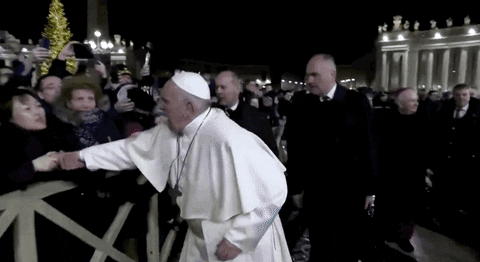Asking “Is the Pope Catholic?” no longer seems to be a merely rhetorical question for many.
Around the world, Pope Francis is understandably rather popular. It’s not just that he’s a good pastor; it’s that he doesn’t hesitate to speak truth to power when he can have an effect.
But he’s probably less popular among US Catholics than anywhere else in the Church. The reasons for that are instructive, and not only for Catholics.
Tom Hoopes, writer in residence at Benedictine College, Kansas, recently published a book of reflections on the message of Pope Francis: What Pope Francis Really Said: Words of Comfort and Challenge. Having followed Hoopes’ writing for a number of years, I respect his opinions even when I disagree with him.
So a few days ago, I lapped up a promotional interview for his book: Why Aren’t Catholics Rallying Around the Pope?. It’s for a conservative Australian publication, and it’s a pleasure to hear him explain conservative American Catholics to conservative Australian Catholics!
One complaint common among Americans is that Francis represents a break with Pope Benedict. That isn’t really true, of course. Hoopes says it’s
“…a difference in style, not substance, in Francis from his predecessors. None of them can be classified as “conservative” or “liberal.” They all have “liberal” views on economics, the environment and immigration and “conservative” views on sexual ethics, the role of religion and “old fashioned” Catholic truths such as the Devil, Mary and Confession.
One stylistic difference is Francis’s harsh attitude toward economic sinners and his red-hot contempt for the Western “myths” he calls out: individualism, consumerism, and blind faith in technology.
That “stylistic difference,” however, sets many conservative American Catholics’ teeth on edge. Most such Catholics are Republicans, originally because of the abortion issue. To be Republican by conviction is, of course, to support “free-market” capitalism, including constant technological innovation and limited government, which usually translates into wanting less labor and environmental regulation as well as reined-in social spending. Given the wave of populism that brought Donald Trump into the White House, it now also means increasing restrictions on immigration and harsher penalties for illegal immigrants.
So it’s largely Francis’ politics that conservative American Catholics dislike. My friend David Mills, another Catholic journalist and editor, notes that they especially resent the Pope’s “…criticism of the kind of totalizing and optimistic kind of free market economics conservative American Catholics embrace…I don’t think you can exaggerate how devoted to their politics many Catholics are, to the point that it drives their religion. This has long been a conservative Catholic critique of liberal Catholics, and not unfairly, but it applies to the right as much as to the left.”
But conservative American Catholics also dislike Francis’ welcoming approach to the divorced-and-remarried. Though I’m all-too-familiar with the intricacies of the dispute, I can’t get into them here. Suffice it to say that many think he’s abandoning the Church’s traditional teaching about the indissolubility of marriage: not by denying it—he actually affirms it, in theory—but by making its pastoral application so flexible as to render it irrelevant. In the conservative Catholic mind, there could hardly be any greater papal sin than that.
The net effect of all these resentments is to make a large swath of theologically educated and influential American Catholics very angry with Pope Francis. Asking “Is the Pope Catholic?” no longer seems to be a merely rhetorical question for many. That is not edifying, but neither is it unprecedented.
This is an interesting time for the Church.
This post Why So Many American Catholics Loathe Pope Francis was originally published on Intellectual Takeout by Michael Liccione.

Sorry, the comment form is closed at this time.